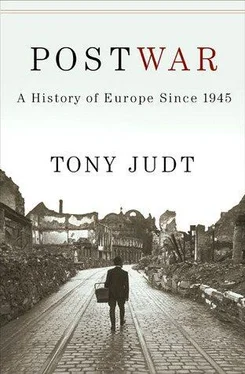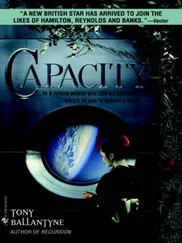But Adenauer could hardly have espoused the division of Germany as a goal, however much he welcomed it in private. His chief opponent in the first years of the Federal Republic, the Social Democrat Kurt Schumacher, was a Protestant from West Prussia and a tireless advocate of German unity. In contrast to Adenauer he would readily have accepted a neutralized Germany as the price for a single German state, which was what Stalin appeared to be offering. And Schumacher’s position was probably the more popular one in Germany at the time, which was why Adenauer had to tread carefully and ensure that the responsibility for a divided Germany fell squarely on the occupying forces.
By 1948 the United States, like Great Britain, was not unhappy to see the emergence of a divided Germany, with American influence dominant in the larger, western segment. But although there were some, like George Kennan, who had perceptively anticipated this outcome (as early as 1945 he had concluded that the USA had ‘no choice but to lead her section of Germany… to a form of independence so prosperous, so secure, so superior, that the east cannot threaten it’), they were in the minority. The Americans, like Stalin, were improvising in these years. It is sometimes suggested that certain key American decisions and declarations, notably the Truman Doctrine of March 1947, precipitated Stalin’s retreat from compromise to rigidity and that in this sense the responsibility for European divisions lay with Washington’s insensitivity or, worse, its calculated intransigence. But this is not so.
For the Truman Doctrine, to take this example, had remarkably little impact on Soviet calculations. President Truman’s March 12th 1947 announcement to Congress that ‘It must be the policy of the United States to support free peoples who are resisting attempted subjugation by armed minorities or outside pressure’ was a direct response to London’s inability to continue with aid to Greece and Turkey following the British economic crisis of February 1947. America would have to take over Britain’s role. Truman thus sought Congressional approval for a $400 million increase in his budget for overseas aid: to secure the funding he presented the request in the context of a crisis of Communist insurgency.
Congress took him seriously, but Moscow did not. Stalin was not much interested in Turkey and Greece—the chief beneficiaries of the aid package—and he understood perfectly well that his own sphere of interest was unlikely to be affected by Truman’s grandstanding. On the contrary, he continued to suppose that there were very good prospects for a split within the Western camp of which the American assumption of erstwhile British responsibilities in the Eastern Mediterranean was a sign and precursor. Whatever led Stalin to adjust his calculations in Eastern Europe, it was decidedly not the rhetoric of American domestic politics. [32] In September 1947 Andrej Zdanov, speaking as always for his master, would inform delegates at the founding Congress of the Cominform that the Truman Doctrine was directed at least as much against Britain as against the USSR, ‘because it signifies Britain’s expulsion from its sphere of influence in the Mediterranean and the Near East’.
The immediate cause of the division of Germany and Europe lies rather in Stalin’s own errors in these years. In central Europe, where he would have preferred a united Germany, weak and neutral, he squandered his advantage in 1945 and subsequent years by uncompromising rigidity and confrontational tactics. If Stalin’s hope had been to let Germany rot until the fruit of German resentment and hopelessness fell into his lap, then he miscalculated seriously—though there were moments when the Allied authorities in western Germany wondered whether he might yet succeed. In that sense the Cold War in Europe was an unavoidable outcome of the Soviet dictator’s personality and the system over which he ruled.
But the fact remains that Germany was at his feet, as his opponents well knew—‘The trouble is that we are playing with fire which we have nothing with which to put out’, as Marshall put it to the National Security Council on February 13th 1948. All the Soviet Union needed to do was accept the Marshall Plan and convince a majority of the Germans of Moscow’s good faith in seeking a neutral, independent Germany. In 1947 this would radically have shifted the European balance of advantage. Whatever Marshall, Bevin or their advisers might have thought of such maneuvers, they would have been helpless to prevent them. That such tactical calculations were beyond Stalin cannot be credited to the West. As Dean Acheson put it on another occasion, ‘We were fortunate in our opponents.’
Looking back, it is somewhat ironic that after fighting a murderous war to reduce the power of an over-mighty Germany at the heart of the European continent, the victors should have proven so unable to agree on post-war arrangements to keep the German colossus down that they ended up dividing it between them in order to benefit separately from its restored strength. It had become clear—first to the British, then to the Americans, belatedly to the French and finally to the Soviets—that the only way to keep Germany from being the problem was to change the terms of the debate and declare it the solution. This was uncomfortable, but it worked. In the words of Noel Annan, a British intelligence officer in occupied Germany, ‘It was odious to find oneself in alliance with people who had been willing to go along with Hitler to keep Communism at bay. But the best hope for the West was to encourage the Germans themselves to create a Western democratic state.
V. The Coming of the Cold War
‘Imagine the Austrian Empire fragmented into a multitude of greater and lesser republics. What a nice basis for universal Russian monarchy’.
František Palacký (April, 1848)
‘The Yugoslavs want to take Greek Macedonia. They want Albania, too, and even parts of Austria and Hungary. This is unreasonable. I do not like the way they are acting’.
Josef Stalin, 1945
‘All that the Red Army needed in order to reach the North Sea was boots’.
Dennis Healey
‘The idea of a European order is not an artificial creation of Germany but a necessity’.
Paul-Henri Spaak (April, 1942)
‘This is something which we know, in our bones, we cannot do’.
Anthony Eden (January, 1952)
‘This war is not as in the past; whoever occupies a territory also imposes upon it his own social system. Everyone imposes his own system as far as his army can reach. It cannot be otherwise.’ Josef Stalin’s famous aphorism—reported by Milovan Djilas in his Conversations with Stalin —was not quite as original as it appeared. World War Two was by no means the first European war in which military outcomes determined social systems: the religious wars of the sixteenth century ended in 1555 at the Peace of Augsburg, where the principle of cuius regio eius religio authorised rulers to establish in their own territory the religion of their choice; and in the initial stages of the Napoleonic conquests in early nineteenth-century Europe, military success translated very quickly into social and institutional revolution on the French model.
Nevertheless, Stalin’s point was clear—and put to Djilas well in advance of the Communist take-over of eastern Europe. From the Soviet side the war had been fought to defeat Germany and restore Russian power and security on its western frontiers. Whatever was to become of Germany itself, the region separating Germany and Russia could not be left in uncertainty. The territories running in a north-south arc from Finland to Yugoslavia comprised small, vulnerable states whose inter-war governments (with the partial exception of Czechoslovakia) had been uniformly hostile to the Soviet Union. Poland, Hungary and Romania in particular had been consistently unfriendly to Moscow and suspicious of Soviet intentions towards them. The only acceptable outcome for Stalin was the establishment—in those parts of the region not preemptively absorbed into the USSR itself—of governments that could be relied upon never to pose a threat to Soviet security.
Читать дальше












